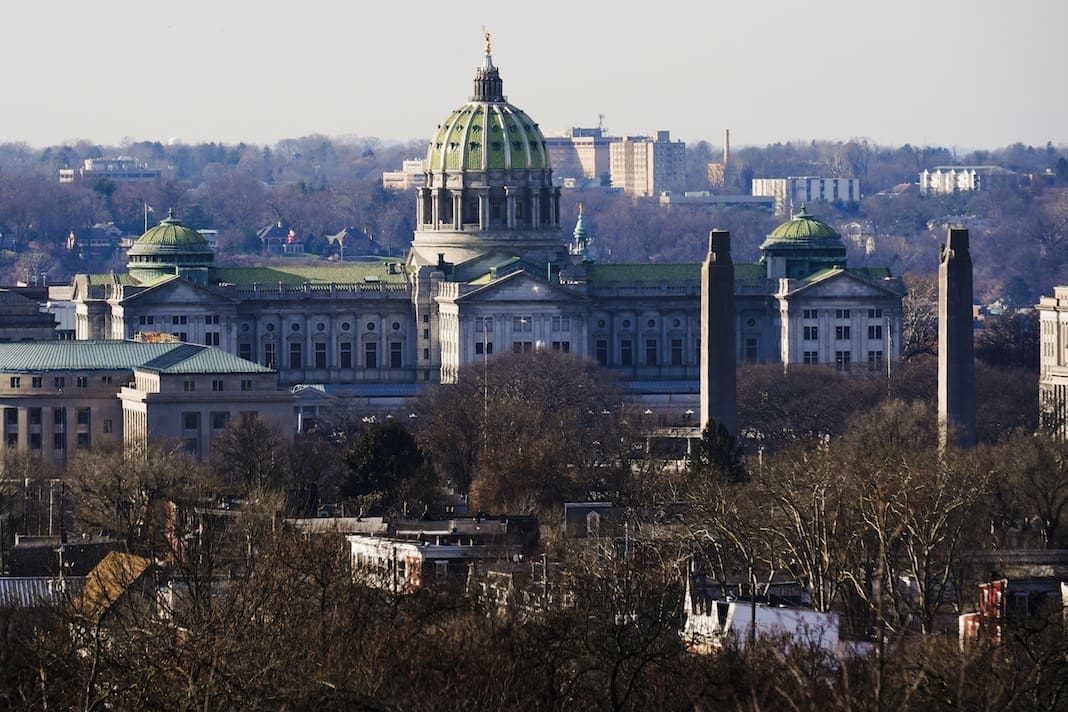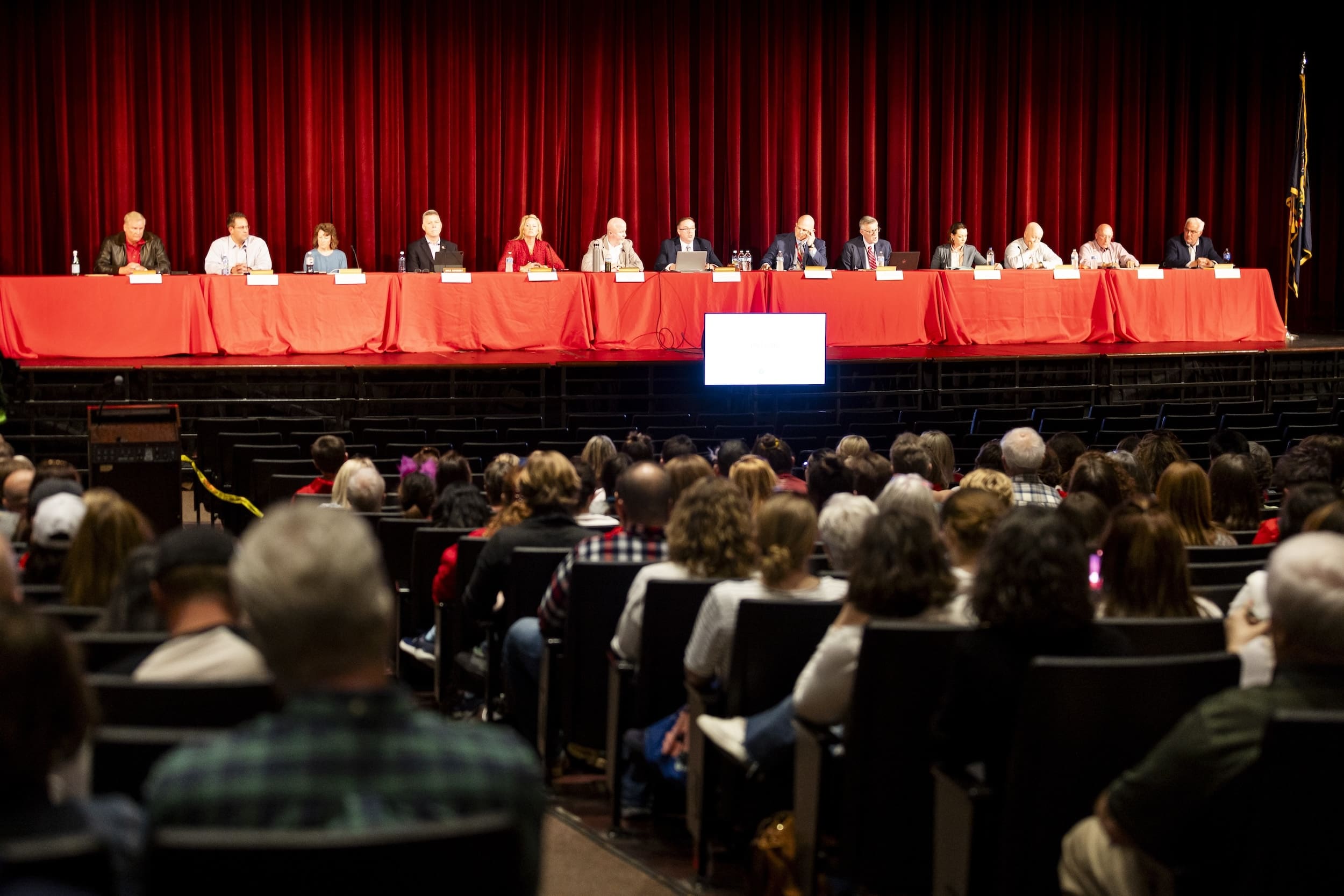Pennsylvania Republicans still want to limit access to abortion
The 2024 Pennsylvania Leadership Conference highlighted speakers from anti-abortion crisis pregnancy centers.

In the last week, former President Donald Trump has shifted his position on abortion, contradicting positions he’s supported in recent months.
On April 8, Trump said he believes abortion is up to the states to regulate, and two days later, on April 10, he repeated that regulating abortion was about “the will of the people” and said that he would not sign a federal abortion ban.
In 1999, Trump said he was “very pro-choice.” In 2016, he threatened to defund Planned Parenthood and said there should be “some form of punishment” for women who have abortions if the procedure were banned. And in February, he reportedly privately said he would support a 16-week federal ban.
While the former president and presumptive Republican presidential candidate appears to have altered his stance on abortion, anti-abortion Republican lawmakers and anti-abortion advocates in Pennsylvania continue to work to ban abortion.
Abortion is legal until up to 24 weeks of pregnancy in the Keystone State and will likely remain so under Democratic Gov. Josh Shapiro, whose term in office ends in three years.
During the 2024 Pennsylvania Leadership Conference, a conservative event held on April 4-6 in Camp Hill, GOP speakers, and panelists talked about issues such as crime, immigration, and abortion, as well as attacking Democrats.
Former Pennsylvania Superior Court Judge Cheryl Allen moderated a panel about the need to protect so-called crisis pregnancy centers, which, according to the American College of Obstetricians and Gynecologists, are facilities that present themselves as reproductive health care clinics but work to dissuade pregnant people from having an abortion or seeking contraception. Her co-panelists were Amy Scheuring, the executive director of the anti-abortion clinic group Women’s Choice Network, and Jill Hartman, the executive director of A Woman’s Concern, a so-called pregnancy resource center in Lancaster.
Hartman advocated for crisis pregnancy centers, claiming they were the ones who “provided real choice” for pregnant women.
“Abortion is never the remedy,” Scheuring said, giving an example of a pregnant mother with two children at home that she’s having trouble feeding who says that she just can’t have a third child and feels she has no choice but to have an abortion. “If she gets an abortion, she goes right back to that same situation, and probably within a year she’ll be pregnant again.”
Scheuring went on to claim that a strong church community and its moral and emotional support erase the need for an abortion, ignoring the many reasons people seek abortion care, such as fetal anomalies or because they simply don’t want to have a child.
On Aug. 3, 2023, Shapiro and Department of Human Services Secretary Val Arkoosh announced that the state would be ending its contract with Real Alternatives, an organization that partners with several anti-abortion crisis pregnancy centers.
In 2021, a number of state senators attempted to initiate an amendment to the state Constitution that would have stipulated there is “no constitutional right to taxpayer-funded abortion or other right relating to abortion.”
The bill passed in both the House and the Senate, but in order to be placed on the ballot, a referendum on a constitutional amendment has to be approved by a majority vote in both chambers of the General Assembly in two successive legislative sessions; the bill did not pass in the House after Democrats won back control in 2022.
The status of Pennsylvania’s abortion law remains tenuous; there is no language in the state’s Constitution that guarantees a right to abortion.
Abortion rights leaders say they’re doubtful of a real change in Trump’s opinions. They believe it’s vital for voters who support legal access to abortion to vote for leaders who support the right to abortion.
“It is exceptionally disingenuous for the former president to suddenly declare that reproductive freedom should be left for the states,” Adam Hosey, the policy director of Planned Parenthood of Pennsylvania, told the Pennsylvania Independent in an email. “He knew exactly what he was doing when he declared he would overturn Roe, and it’s his Supreme Court appointees that prioritized political agendas over the Constitution, science, or medicine that got us where we are.”
It’s not just Pennsylvania’s Republican state senators who oppose the right to abortion; several members of the state House have as well.
Two days after the U.S. Supreme Court overturned the constitutional right to abortion with its 2022 decision in Dobbs v. Jackson Women’s Health Organization, Republican Rep. Kate Klunk, who represents the 169th House District, called the decision prudent, saying, “I believe one of the universal core values of government is the protection of its citizens: born and unborn. As co-chair of the Pro-Life Caucus, I will continue to promote legislation that protects the unborn while also valuing women’s health, improving children’s access to health care, supporting schooling, job training and other important programs that lead to opportunity and good quality of life for all.”
Republican Rep. Donna Oberlander voted in favor of requiring a funeral or cremation for the medical remains resulting from an abortion. She also voted to prohibit abortions based on a diagnosis of Down Syndrome and in favor of a bill prohibiting coverage of abortion by policies obtained through health insurance exchanges.
Pennsylvania Democrats currently retain a one-person majority in the state House, and Posey said it’s crucial that Democrats maintain their majority in order to protect reproductive rights: “The candidates we support, support abortion and without federal protections, that couldn’t be more important at the state level.”
After news broke that the Arizona Supreme Court had ruled that the state’s 1864 law banning abortion could be enforced, Shapiro responded on the social media platform X, reiterating his commitment to protecting reproductive rights: “This is what ‘leaving abortion up to the states’ looks like.”
According to a 2024 public health survey conducted by Muhlenberg College, nearly 60% of residents of the commonwealth say they do not approve of adding more limits on access to abortion. In a new KFF survey, 50% of all registered voters in the U.S. said the 2024 elections will have a major impact on abortion access.




